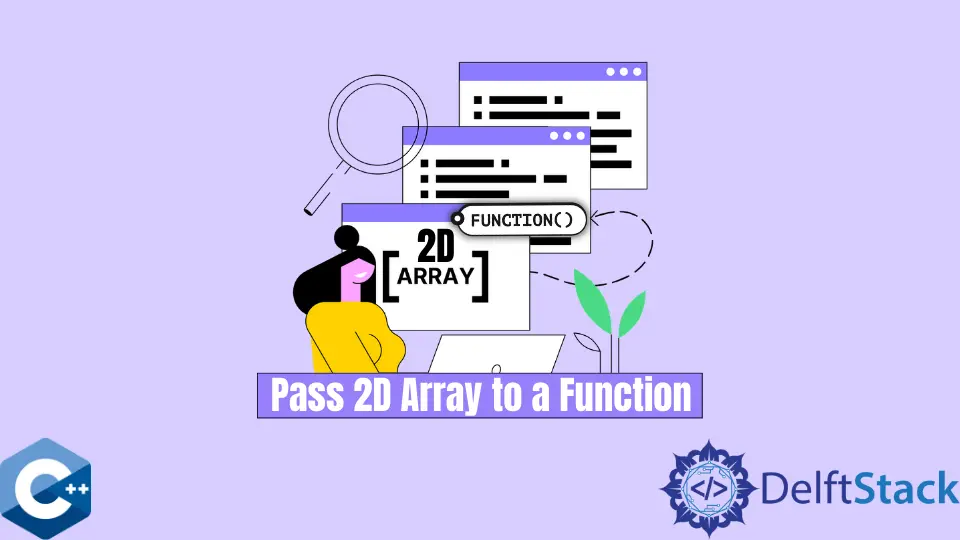2D 배열을 C++의 함수에 전달하는 방법

이 기사에서는 C++에서 2D 배열을 함수 매개 변수로 전달하는 방법을 소개합니다.
[]표기법을 사용하여 2D 배열을 함수 매개 변수로 전달
이 방법을 설명하기 위해 c_array라는 이름의 고정 길이 2 차원 배열을 정의하고 모든 요소에 2를 곱하기 위해 매개 변수로 MultiplyArrayByTwo함수에 전달합니다. 이 함수는void 유형이며c_array 객체에서 직접 작동합니다. 이렇게하면main 루틴에서 2D 배열의 곱셈 버전에 직접 액세스 할 수 있습니다.
#include <iomanip>
#include <iostream>
#include <vector>
using std::cin;
using std::cout;
using std::endl;
using std::setw;
using std::string;
using std::vector;
constexpr int size = 4;
void MultiplyArrayByTwo(int arr[][size], int len) {
for (int i = 0; i < len; ++i) {
for (int j = 0; j < len; ++j) {
arr[i][j] *= 2;
}
}
}
int main() {
int c_array[size][size] = {
{1, 2, 3, 4}, {5, 6, 7, 8}, {9, 10, 11, 12}, {13, 14, 15, 16}};
cout << "input array\n";
for (int i = 0; i < size; ++i) {
cout << " [ ";
for (int j = 0; j < size; ++j) {
cout << setw(2) << c_array[i][j] << ", ";
}
cout << "]" << endl;
}
MultiplyArrayByTwo(c_array, size);
cout << "output array\n";
for (int i = 0; i < size; ++i) {
cout << " [ ";
for (int j = 0; j < size; ++j) {
cout << setw(2) << c_array[i][j] << ", ";
}
cout << "]" << endl;
}
cout << endl;
return EXIT_SUCCESS;
}
출력:
input array
[ 1, 2, 3, 4, ]
[ 5, 6, 7, 8, ]
[ 9, 10, 11, 12, ]
[ 13, 14, 15, 16, ]
output array
[ 2, 4, 6, 8, ]
[ 10, 12, 14, 16, ]
[ 18, 20, 22, 24, ]
[ 26, 28, 30, 32, ]
&표기법을 사용하여 2D 배열을 함수 매개 변수로 전달
또는 &참조 표기법을 사용하여 2D 배열을 매개 변수로 전달할 수 있습니다. 그러나이 두 가지 메서드는 스택에 선언 된 고정 길이 배열과 만 호환됩니다. 가독성을 위해 범위 기반으로 MultiplyArrayByTwo함수 루프를 변경했습니다.
#include <iomanip>
#include <iostream>
#include <vector>
using std::cin;
using std::cout;
using std::endl;
using std::setw;
using std::string;
using std::vector;
constexpr int size = 4;
void MultiplyArrayByTwo(int (&arr)[size][size]) {
for (auto& i : arr) {
for (int& j : i) j *= 2;
}
}
int main() {
int c_array[size][size] = {
{1, 2, 3, 4}, {5, 6, 7, 8}, {9, 10, 11, 12}, {13, 14, 15, 16}};
cout << "input array\n";
for (int i = 0; i < size; ++i) {
cout << " [ ";
for (int j = 0; j < size; ++j) {
cout << setw(2) << c_array[i][j] << ", ";
}
cout << "]" << endl;
}
MultiplyArrayByTwo(c_array);
cout << "output array\n";
for (int i = 0; i < size; ++i) {
cout << " [ ";
for (int j = 0; j < size; ++j) {
cout << setw(2) << c_array[i][j] << ", ";
}
cout << "]" << endl;
}
cout << endl;
return EXIT_SUCCESS;
}
Founder of DelftStack.com. Jinku has worked in the robotics and automotive industries for over 8 years. He sharpened his coding skills when he needed to do the automatic testing, data collection from remote servers and report creation from the endurance test. He is from an electrical/electronics engineering background but has expanded his interest to embedded electronics, embedded programming and front-/back-end programming.
LinkedIn Facebook